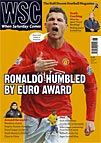 Argentina have a new coach with a glorious playing past but, as Chris Bradley writes, many fans are uncertain about his future
Argentina have a new coach with a glorious playing past but, as Chris Bradley writes, many fans are uncertain about his future
It has been a roller-coaster few weeks for the Argentine national team. It began on October 15 when they fell to ignominious defeat against a superior Chile side, for whom it was a first ever victory over Argentina in a World Cup qualifier. Between that low and their 1-0 friendly win over Scotland on November 19, they have lived something of a soap opera.
Alfio Basile, in his second stint as coach, threw in the towel. Diego Maradona then emerged from a pack of more qualified replacements, was paraded excitedly before all the world’s media, then allegedly threatened to quit after just ten days, before finally celebrating victory at Hampden Park.
Basile’s resignation followed a string of poor results, including unconvincing draws against Ecuador and Belarus as well as the Chile defeat. Argentina’s successful Olympic campaign, led by youth-team boss Sergio Batista, came in the middle of this run and only highlighted the senior team’s failures. Suffering problems similar to pre-Capello England, Basile just didn’t seem able to mould a squad of club superstars into a cohesive unit. He became only the second manager of Argentina to resign before his contract expired. The first, Marcelo Bielsa, now leads the Chile side that humbled Basile’s men.
Early favourites to replace him included Maradona’s former team-mate Batista, fresh from Olympic gold in Beijing. There was Diego Simeone, whose River Plate side won the league title in June. Yet the latter’s stock plummeted rapidly and, with the club rooted to the foot of the table, he walked away from River in early November. Then there was Carlos Bianchi, the man who began the most successful period in Boca Juniors’ history just over a decade ago. He was the overwhelming fans’ favourite, gaining more than half the votes in an online poll by Argentine daily La Nacion.
Julio Grondona, who has presided over the AFA since 1979, had sole responsibility for the decision. There are suggestions he intends, finally, to stand down at the end of this term, so if 2010 is to be his last World Cup, he wants to go out with a bang.
Grondona has had his differences with Maradona, often connected with previous refusals to consider him for this very post. However, it seems all is now sweetness and light. Maradona recently commended Grondona’s sense in having overlooked him until now. Yet the AFA president was way ahead of him in the mutual back-slapping. “Personally, I have been wanting to see Maradona in charge of the national team since 1979,” he told a radio station, adding that he was hoping for a team with similar characteristics to that of 1986.
That aim was furthered by the nomination of Carlos Bilardo, manager during the 1986 and 1990 World Cup campaigns, as “technical secretary”. Bilardo insists that he will leave tactics and selection issues to Maradona. It seems more likely his task is to keep the fledgling coach on the straight and narrow. He will act to defuse situations such as the row over Maradona’s choice of assistant which, reportedly, has already had him on the brink of resignation.
This was the kind of incident many Argentine fans were already dreading. In polls listing a selection of candidates, Maradona had received scarcely five per cent of the vote. Following his official confirmation, some 70 per cent of fans were against the idea. His past personal problems, allied to his tendency to shoot his mouth off, are only part of the reason for this response. His lack of experience is a great cause for alarm: he briefly took charge of Deportivo Mandiyú (achieving one win in 12 games) and Racing Club (two from 11), while serving his drug suspension in 1994. He hasn’t worked in football since retiring as a player in 1997.
Victory in Scotland at least allowed Maradona to keep his critics at bay for now. Looking for more pride from his players, he has since made it known that nobody, other than new captain Javier Mascherano, is guaranteed a place in his team. “I love Román [Riquelme],” he said recently. “I told him that he is my player. I said the same to [Lionel] Messi. But healthy competition is good. They will play, depending on how they can adapt.” That should act as a wake-up call. If there is one quality about Maradona that nobody can deny, it is his passion for his country. If he doesn’t see that in his new charges, he is not the sort to keep quiet.
From WSC 263 January 2009